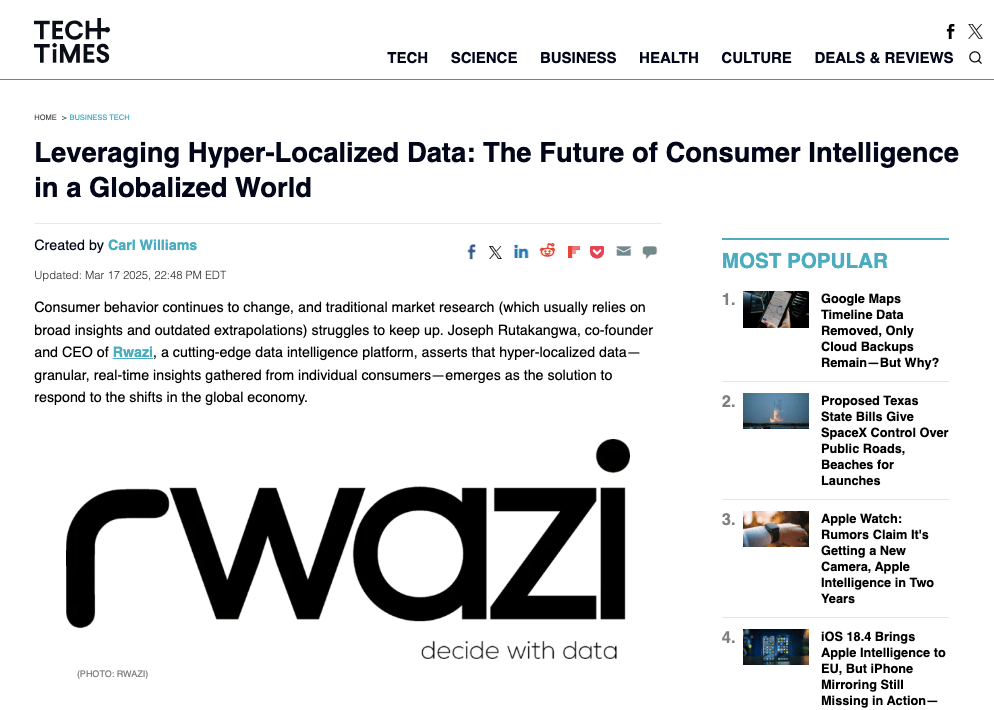
You are welcome to Market Mosaic, where we are analysing in this week's edition the shifts transforming the global economy – from Apple's billion-dollar streaming gambit to the consumer spending revolution that's sending shockwaves through markets.
We pull back the curtain on the hidden economic stories reshaping our world: how technology giants strategize loss, why consumers are rewriting spending rules, and what these signals mean for you.
Buckle up for a deep dive into the consumer market signals that are rewriting the rules of business engagement.
— Insights Team, Rwazi
Our Edition this week:
SECTOR PERFORMANCE TRACKER

This weekly market intelligence dashboard was compiled and analyzed by Rwazi Insights
TECHNOLOGY & INNOVATION
Apple TV+ and the ecosystem play in a streaming strategic gamble

Apple's streaming service, Apple TV+, is projected to lose between $1-2 billion annually - a calculated strategic investment rather than a financial misstep. With approximately 45 million subscribers and a $5+ billion annual content budget, the service represents a sophisticated customer acquisition strategy.
Context:
Less than 1% of monthly TV viewership
$15-20 billion expected losses over first decade
Primary goal: Driving hardware ecosystem engagement
Despite seemingly poor financial performance, Apple's approach reveals a nuanced long-term strategy. The streaming service acts as a loss leader, creating stickiness within the Apple ecosystem where hardware sales generate $93.7 billion in annual profits.
Key Insight: In the digital economy, strategic investments that appear financially inefficient can serve critical customer acquisition and retention objectives, fundamentally reshaping traditional ROI calculations.
FINANCIAL SERVICES & ECONOMY
Consumer spending fatigue finally emerges

Chart and data analysis by Rwazi Insights
A significant economic trend is emerging: Retailers and businesses are witnessing a profound shift in purchasing behaviors driven by economic uncertainty.
Spending Indicators:
Apparel spending is down 12% year-over-year
Luxury in-store spending dropped 9.3%
Consumers shifting to lower-cost protein options
Wage growth plummeting
Checking account balances declining
Major companies like Walmart, McDonald's, and airlines are adjusting forecasts, signaling a broader economic recalibration. Consumers are increasingly price-sensitive, prioritizing essentials and seeking value across all income segments.
Key Insight: Economic uncertainty is democratizing cost-consciousness, transforming consumer spending from a segmented behavior to a universal strategy of financial prudence.
CONSUMER GOODS & RETAIL
When the world's largest retailers whisper, global markets listen

Chart and data analysis by Rwazi Insights
Walmart's conservative growth forecast has sent ripples through global markets across the world, particularly Asia (a growing consumer powerhouse) with the retail giant projecting only 3-4% full-year sales growth compared to last year's 5.1%.
Market reaction: Dow fell 1%, S&P 500 dipped 0.4%, and Walmart stock tumbled 6% with a projected sales growth of 3-4% (vs. previous 5.1%)
However, our data analysis notes the tendency to continue the year cautiously, potentially leaving room for upward revision. Retailers’ ability to leverage scale and negotiate with suppliers provides a buffer against economic headwinds.
Key Insight: Walmart's performance serves as a key economic barometer, suggesting that even robust retailers are preparing for potential consumer spending contraction.
SUPPLY CHAIN & LOGISTICS
Navigating global trade uncertainties

Small and medium-sized businesses face unprecedented challenges in managing supply chains amid global trade disruptions.
Retailers report significant concerns about unpredictable trade policies, limited resources for supply chain management and the need for adaptive strategic approaches.
Emerging strategies our analysis offer are for businesses to consider diversifying supplier networks, investing in predictive analytics and developing flexible logistics frameworks.
Key Insight: Supply chain resilience is becoming a critical competitive advantage, requiring businesses to develop agile, technology-enabled approaches to global trade complexities.

As we navigate the intricate global consumer economy, one truth becomes crystal clear: adaptability is the new competitive advantage. Success will belong to organizations and business leaders who can read subtle market signals, pivot rapidly, and create value in unexpected ways.
Thank you for reading and joining us on Market Mosaic this week. We hope this edition provides valuable, actionable insights for decisions with data. 📊
Stay tuned for exclusive insights as we introduce exciting new features designed to enhance your valued subscriber and user experience at Market Mosaic.
How has Market Mosaic impacted your business decision-making?
WHAT IS HAPPENING AT RWAZI?
Our hyper-local market intelligence gains feature in global tech media

In a recent feature by TechTimes, we shared groundbreaking insights into the future of consumer market research. The story, "Leveraging Hyper-Localized Data: The Future of Consumer Intelligence in a Globalized World," underscores our revolutionary approach to understanding consumer behaviour worldwide.
In an era where brand loyalty is declining and consumer preferences shift at unprecedented speeds in an increasingly complex global market, our AI-powered, zero-party market intelligence platform offers global businesses a critical competitive advantage by tracking consumer trends in real time.

